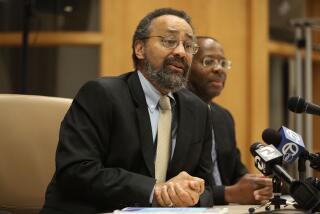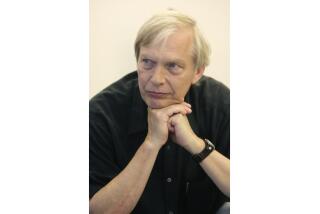Dr. Charles Edwards dies at 87; led Scripps foundation
- Share via
Dr. Charles Edwards, a major figure in public health issues as a federal official and later as president of the Scripps Clinic and Research Foundation in San Diego, died Aug. 7 at his home in La Jolla after a lengthy illness. He was 87.
Edwards, the son of a country doctor from Nebraska, served as a Navy surgeon for combat Marines during the Korean War and later joined the faculty at Georgetown University Hospital in Washington, D.C., and then the staff of the American Medical Assn. in Chicago.
President Nixon in 1969 appointed Edwards as commissioner of the Food and Drug Administration. Edwards helped expand the FDA’s role in reviewing drugs before they can be marketed, and in probing the link between food and food supplements and public health.
In 1973 he was appointed assistant secretary for health in the Department of Health, Education and Welfare. He reorganized the Public Health Service and boosted the budget and reach of the Centers for Disease Control. During his tenure, several large-scale recalls of tainted foods were ordered.
Known for his candor and belief in making healthcare widely available and affordable, Edwards resigned in 1975 amid the Ford administration’s effort to make budget cuts that he thought could hurt healthcare for the poor and unemployed.
In 1977 he became president and chief executive of the Scripps Clinic and Research Foundation, a predecessor of the Scripps Research Institute. Through expansion and consolidation, he oversaw creation of the Scripps Institutions of Medicine and Science, with a network of hospitals, clinics and research facilities throughout San Diego County.
The effort at merging various parts of Scripps required tact, patience and hard bargaining to overcome institutional resistance and the sometimes clashing agendas of physicians and researchers. It was a job at which Edwards, a veteran administrator respected by all sides, was said to be ideally suited.
Edwards retired in 1993, with the Scripps organization firmly established as a national leader in research and a major provider of healthcare in California.
Even after he moved to San Diego, Edwards had continued to play a role in national health policy. When the FDA became ensnared in scandals involving conflicts of interest, Edwards was named in 1990 to head a 12-person committee to review the agency.
“There are a lot of things that need to be changed,” Edwards said when the committee issued a wide-ranging report.
The management changes suggested by the committee, including bringing in more top-level scientists, were later credited with restoring the agency’s credibility and effectiveness.
Charles Cornell Edwards was born in Overton, Neb., on Sept. 16, 1923. He received his bachelor’s and medical degrees from the University of Colorado and was a surgical resident at the University of Minnesota when he was called into the service during the Korean War.
His career included private practice in Iowa and work for the Central Intelligence Agency. In San Diego, he served on the boards of the YMCA and San Diego Hospice.
“Charlie left his mark on some of the nation’s most prominent institutions, including ours,” said Dr. Richard A. Lerner, president of Scripps Research Institute.
Edwards is survived by his wife of 66 years, Sue Kruidenier Edwards; sons Timothy Kruidenier Edwards, Charles Cornell Edwards Jr. and David Busby Edwards; daughter Nancy Edwards Schned; and eight grandchildren.
More to Read
Sign up for Essential California
The most important California stories and recommendations in your inbox every morning.
You may occasionally receive promotional content from the Los Angeles Times.



























































